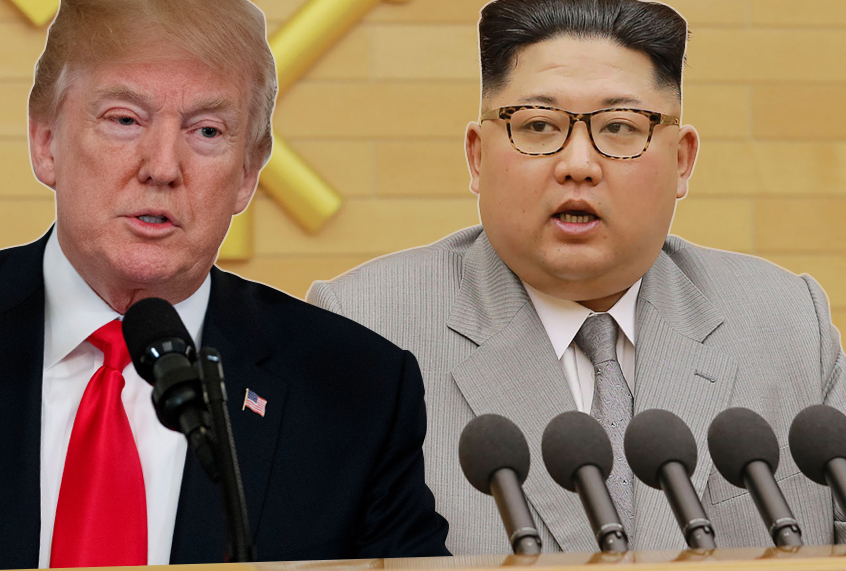It seems like ages ago when political leaders were seriously talking about President Donald Trump winning a Nobel Peace Prize. In light of North Korea’s suspension of talks with South Korea over the Max Thunder aerial drills, and national security adviser John Bolton’s comparison of upcoming talks with North Korea to those undertaken with Libya in 2003, the question is now twofold: Will the proposed summit between Trump and North Korean leader Kim Jong-un happen at all? Or are the North Koreans simply taking Trump for a ride.
“I’ll begin with the caveat that most everybody would make,” said Tony Arend, a professor and dean in the Walsh School of Foreign Service at Georgetown University, in an interview with Salon. “That is, we don’t fully understand what’s in the mind of Kim Jong-un on a variety of issues and we’re always trying to get more intelligence.
“That having been said, my perception is that he is feeling that he has gotten a lot of recognition from the United States,” Arend continued. “He’s gotten the president of the United States to agree to a summit to discuss issues on the [Korean] peninsula, and I think he’s pushing to see how much he can get from the United States in the way of concessions. So he perceives himself to be in a position of strength.”
If the Trump administration “seems so invested in a deal,” Arend went on, Kim might be eager to see what further concessions it is willing to grant. “So I see him testing the waters and pushing the United States.”
His views were largely shared by Gordon Chang, a Daily Beast columnist and author of “Nuclear Showdown: North Korea Takes on the World.”
“North Korea has talked about John Bolton and his ‘hostile attitudes,’ as they put it,” Chang told Salon, adding that he doubted Bolton’s comments about the “Libyan model” played a major role, since those were made during a “Face the Nation” interview in late April. “After that, the North Koreans released the three Americans, so it’s unlikely that Bolton was the motivating factor,” Chang said. “I think there must have been something else that got the North Koreans upset.”
Chang then speculated that one factor could well have been Secretary of State Mike Pompeo’s offer to take North Korea of the official U.S. list of “state sponsors of terrorism” if the Kim regime hands over five nuclear devices. “That’s much closer in time to North Korea’s statement,” he said, “and it also corresponds with something that North Korea said in that statement … is about compensation for giving up their most destructive weapons.”
“There are things that the North Korean aren’t saying,” Chang said. “I think they’re using Bolton as an excuse.”
Ankit Panda, adjunct senior fellow at the Federation of American Scientists, told Salon that North Korea may also have concerns about whether recent American rhetoric and foreign policy actions — particularly Bolton’s comments and the South Korean aerial tests — reflected a lack of seriousness about the proposed diplomatic talks.
One interpretation Panda offered was that the North Koreans “effectively thought the U.S. wasn’t being serious, was running sort of an arrogant victory lap before the talks had taken place, and was still setting up complete denuclearization as the benchmark. So they put out a statement saying that we can’t really meet on the basis of that because we’re not going to give up our nuclear weapons.
“None of this is surprising to people who have been watching the Korean peninsula for a long time,” Panda concluded. “North Korea has taken a similar approach to talks with the United States before, but the Trump administration, either willfully or by accident, simply hasn’t paying attention to the details.”
One underlying problem, as foreign policy experts have previously told Salon, is that Trump already made a major diplomatic concession to Kim Jong-un by agreeing to meet with him, something no previous U.S. president has ever done. As a result, North Korea is now in a position to humiliate Trump if he fails to extract major concessions from the Kim dictatorship. In typical fashion, Trump has made clear that he hopes to achieve a lasting peace between North and South Korea, a maddeningly difficult goal that is of course impossible without North Korean cooperation. Kim’s government understands this perfectly well.
The North Korean “end game,” Chang said, “is to keep their most destructive weapons, have a meeting with President Trump which legitimizes Kim Jong-un, and be able to continue to threaten the rest of the world. Getting relief from sanctions, getting money from South Korea … there’s a whole laundry list of things that they want. The question is whether they’ll get them or not, which is a different story. And it’s up to President Trump to make sure that they don’t.”
Arend noted that North Korea may simply be preemptively establishing the pretext it can use to undermine the Trump-Kim summit, if and when it actually happens.
“It could also simply be a way of North Korea scuttling the summit and scuttling any kind of agreement by putting up this roadblock, and then if the United States doesn’t agree to it, to say, ‘Well, we’re just not going to be able to move forward,'” Arend said. “Then Kim Jong-un can present himself as saying, ‘I was being cooperative. I was being collaborative. I returned the three hostages … I tried, but the United States once again was an impediment to any kind of peace discussions.'”

